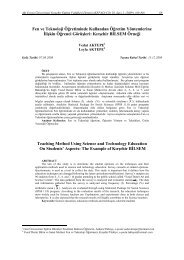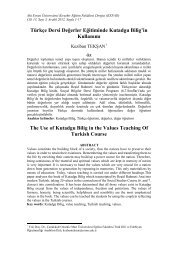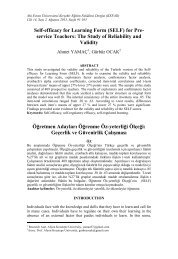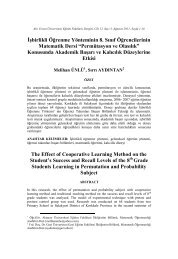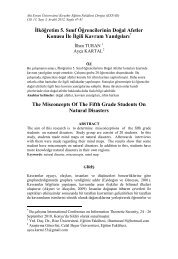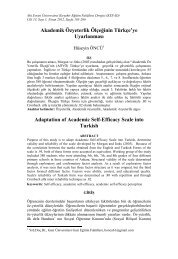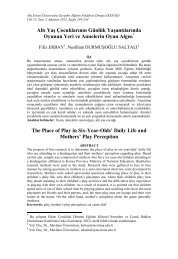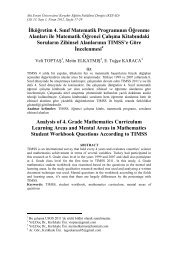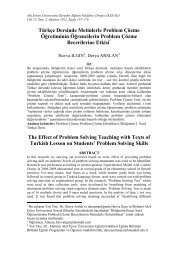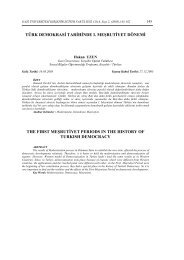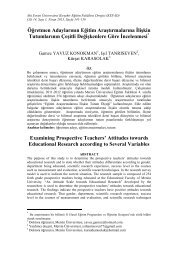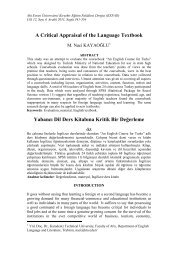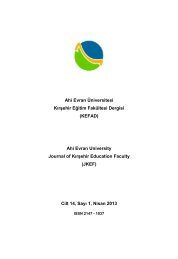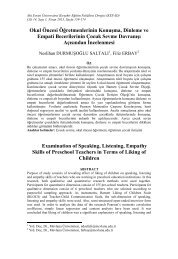Ä°lköÄretim ÃÄrencilerinin Bilim Ä°nsanı ve Bilimsel Bilgi ... - KEFAD
Ä°lköÄretim ÃÄrencilerinin Bilim Ä°nsanı ve Bilimsel Bilgi ... - KEFAD
Ä°lköÄretim ÃÄrencilerinin Bilim Ä°nsanı ve Bilimsel Bilgi ... - KEFAD
Create successful ePaper yourself
Turn your PDF publications into a flip-book with our unique Google optimized e-Paper software.
324 İlköğretim Öğrencilerinin <strong>Bilim</strong> İnsanı… V. H. Kaya, Ö. Afacan, D. Bolat, A. Urtekin60 students (20 students in each grade) of a primary school in the county,Kaman.Open-ended questions on "scientists" and "scientific knowledge" were used asthe data collection instrument. The questions in the instrument were editedconsidering the suggestions of 3 experts of natural and applied sciences andpiloted with a group of 6 students to determine their usability. Since the studentsin the pilot study completed the sur<strong>ve</strong>y in 20 minutes, the time was set as 20minutes during the actual application in the study. The students were informedthat the information that they provided would be strictly kept confidential andwould not be used in other studies.The students were asked to provide their written responses to the questions andthe data collected were subject to content analysis. The aim of the contentanalysis is to find out the concepts and relationships that might explain thecollected data (Kıncal, 2010). During the content analysis, the data were firstconceptualized and then concepts emerging during the analysis were organizedreasonably and categorized based on this organization (Yıldırım & Şimşek,2011).The findings of the study re<strong>ve</strong>aled that the students were of the opinion thatscientists are people that share some traits such as in<strong>ve</strong>nting and disco<strong>ve</strong>ring,involving in scientific work, helping people and working hard. In this <strong>ve</strong>in, theimage as determined by the students in this study is not in alignment with theimage reflected in other studies. In the current study, the students provided viewsthat reflected the importance of the personality traits required by the occupationsof the scientists rather than how scientists were seen. Moreo<strong>ve</strong>r, there are somedifferences in other studies in terms of the gender of scientists. Howe<strong>ve</strong>r, thestudents propose that in order to be a scientist, it is necessary that they chooseoccupations in science and technology, medicine and astronomy. While half ofthe students think that science and technology teachers are scientist, some do notagree on that. The reason why students in 7 grade think that science andtechnology teachers are scientists might be the fact that their teachers ha<strong>ve</strong> amaster's degree, which is reflected in the students' views.While almost half of the students in all grades claim that scientific knowledgecan change in course of time, the rest think that it does not. In another study, itwas determined that the activities on the nature of science affected students'views positi<strong>ve</strong>ly towards scientists and scientific knowledge (Can, 2008).Therefore, the nature of science plays a crucial role in informing students aboutscientific knowledge and scientists.In the current study, students' views on scientists' personal and occupationaltraits were not found to be detailed and needed enriching. The findings alsore<strong>ve</strong>aled that the responses provided to the questions were more hearsay orsuperficial. The results of the current study indicate that the term, scientist,



